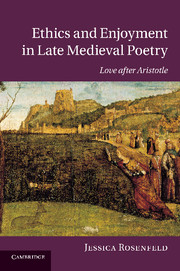Book contents
- Frontmatter
- Contents
- Acknowledgments
- Introduction: love after Aristotle
- 1 Enjoyment: a medieval history
- 2 Narcissus after Aristotle: love and ethics in Le Roman de la Rose
- 3 Metamorphoses of pleasure in the fourteenth-century dit amoureux
- 4 Love's knowledge: fabliau, allegory, and fourteenth-century anti-intellectualism
- 5 On human happiness: Dante, Chaucer, and the felicity of friendship
- Coda: Chaucer's philosophical women
- Notes
- Bibliography
- Index
- CAMBRIDGE STUDIES IN MEDIEVAL LITERATURE
5 - On human happiness: Dante, Chaucer, and the felicity of friendship
Published online by Cambridge University Press: 04 February 2011
- Frontmatter
- Contents
- Acknowledgments
- Introduction: love after Aristotle
- 1 Enjoyment: a medieval history
- 2 Narcissus after Aristotle: love and ethics in Le Roman de la Rose
- 3 Metamorphoses of pleasure in the fourteenth-century dit amoureux
- 4 Love's knowledge: fabliau, allegory, and fourteenth-century anti-intellectualism
- 5 On human happiness: Dante, Chaucer, and the felicity of friendship
- Coda: Chaucer's philosophical women
- Notes
- Bibliography
- Index
- CAMBRIDGE STUDIES IN MEDIEVAL LITERATURE
Summary
Chaucer's Troilus and Criseyde famously begins with a statement of purpose, “The double sorwe of Troilus to tellen.” Telling of sorrow, not happiness, informs the activity of the poet, and Troilus' double sorrow structures the consolatory context of the poem as it is most broadly read: Pandarus first consoles his friend by conveying his loved object to him, and the loss of Criseyde inaugurates another period of sorrow that is consoled only in death. Yet despite the narrator's initial foreboding announcement, and the fact that almost every medieval reader knew precisely the trajectory of Troilus and Criseyde's love affair, Chaucer still allows for an experience of love's bliss at the center of his poem. In Book iii, when the lovers are finally joined together, the narrator asks his audience to consider erotic happiness in the terms of clerkly discourse. Deliberately placing his words in the context of moral philosophy, he speaks of the joy experienced by the two lovers:
This is no litel thyng of for to seye;
This passeth every wit for to devyse;
For ech of hem gan otheres lust obeye.
Felicite, which that thise clerkes wise
Comenden so, ne may nought here suffise;
This joie may nought writen be with inke;
This passeth al that herte may bythynke
(iii.1688–94).The joy experienced by Troilus and Criseyde is beyond the conceptual capacities of writing, clerks, or the heart. Suddenly, clerkly happiness appears not to be happiness at all, for it is not “sufficient.”
- Type
- Chapter
- Information
- Ethics and Enjoyment in Late Medieval PoetryLove after Aristotle, pp. 135 - 159Publisher: Cambridge University PressPrint publication year: 2010



